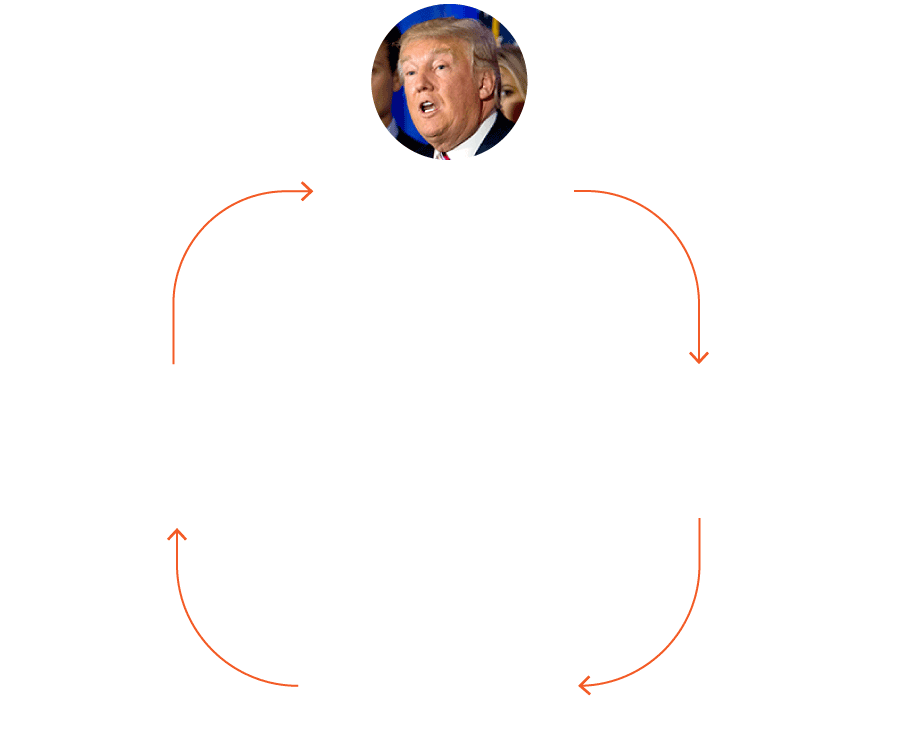Investigating The Link Between Aircraft And Political Favoritism In The Trump Administration

Table of Contents
Boeing and the Air Force One Replacement
The replacement of Air Force One, the presidential aircraft, became a focal point of controversy during the Trump administration. Boeing, a major defense contractor, was awarded the contract for building two new 747-8 aircraft. This decision, and its execution, sparked numerous questions about potential political favoritism and ethical concerns surrounding government procurement.
-
Contract Award and Initial Cost Estimates: The contract, initially estimated at several billion dollars, faced significant scrutiny due to its size and the perceived lack of competitive bidding. Reports suggest the final cost significantly exceeded initial projections, leading to accusations of cost overruns and wasteful spending.
-
Connections and Campaign Donations: Analyzing the connections between Boeing executives, their campaign donations to the Trump campaign and related PACs, and administration officials involved in the procurement process is crucial. While direct evidence of quid pro quo may be difficult to establish, the proximity of these factors fuels suspicion.
-
Criticisms Regarding the Selection Process: Critics pointed to a lack of transparency in the selection process, arguing that other aircraft manufacturers were not given a fair opportunity to bid. This lack of competitive bidding raised concerns about potential favoritism and a lack of cost-effectiveness.
-
News Articles and Reports: Several news outlets published articles highlighting the rising costs and questioning the rationale behind the contract award. These reports often cited concerns voiced by government watchdogs and ethics experts.
Lockheed Martin and Fighter Jet Contracts
Lockheed Martin, another prominent defense contractor, received substantial contracts for F-35 fighter jets during the Trump administration. The scale of these contracts, combined with Lockheed Martin’s substantial political contributions, generated significant debate about the potential influence of campaign contributions on government decisions.
-
F-35 Contracts and Cost Inflation: The F-35 program, already notorious for its high cost, continued to see significant spending during this period. Concerns about cost inflation and the overall value for money involved in these contracts were frequently raised.
-
Political Contributions and Contract Awards: Examining Lockheed Martin's political contributions, including campaign donations and lobbying expenditures, is essential to evaluating potential links between these contributions and the awarding of these massive contracts. Data on these contributions should be analyzed for correlation and potential influence.
-
Arguments For and Against F-35 Procurement: The debate surrounding the F-35 program encompasses arguments about national security needs, technological superiority, and cost-effectiveness. These debates often highlight the complexities of balancing defense spending with fiscal responsibility.
-
Lobbying Efforts and Influence: Understanding Lockheed Martin’s lobbying activities during this time and their potential influence on decision-making within the Trump administration is crucial to a thorough examination of this issue. Transparency in lobbying efforts is vital for evaluating potential conflicts of interest.
The Role of Campaign Donations and Lobbying
The relationship between campaign donations, lobbying efforts, and the awarding of aircraft contracts during the Trump administration requires close scrutiny. The substantial sums of money exchanged between defense contractors and political campaigns raise significant ethical concerns.
-
Campaign Finance Data Analysis: Analyzing campaign finance data to determine the magnitude of contributions made by Boeing, Lockheed Martin, and other defense contractors to the Trump campaign and related PACs is a crucial step in understanding potential influences.
-
Revolving Door Phenomenon and Conflicts of Interest: The “revolving door” phenomenon, where individuals transition from roles within the defense industry to positions within the government and vice-versa, raises significant concerns about potential conflicts of interest. This necessitates careful examination of personnel movements and their potential influence on contract awards.
-
Effectiveness of Lobbying Efforts: Research into the lobbying activities of defense contractors is essential to understanding their potential impact on government policies and decision-making processes related to aircraft procurement.
-
Regulations and Potential Loopholes: Evaluating the effectiveness of regulations governing campaign finance and lobbying is essential. Identifying potential loopholes that might have allowed undue influence is vital for recommending future reforms.
The Implications for Government Transparency and Accountability
The potential for political favoritism in the awarding of aircraft contracts has significant implications for government transparency, accountability, and public trust. The lack of transparency in the process undermines the integrity of government spending and raises concerns about potential waste, fraud, and abuse.
-
Impact on Public Trust: The perception of political favoritism erodes public trust in the government's ability to manage taxpayer money effectively and fairly.
-
Reforms to Improve Transparency: Implementing stricter regulations, improving transparency in the government procurement process, and enhancing oversight mechanisms are crucial to preventing future instances of favoritism.
-
Role of Investigative Journalism and Oversight: Investigative journalism and government oversight bodies play a vital role in uncovering potential wrongdoing and holding those responsible accountable. Strengthening these mechanisms is essential.
-
Long-Term Consequences: The potential long-term consequences of such practices include compromised national security, economic instability, and a diminished public faith in democratic institutions.
Conclusion:
The awarding of aircraft contracts during the Trump administration raises serious questions about political favoritism and the integrity of the government procurement process. While definitive proof of direct quid pro quo exchanges may be difficult to obtain, the close relationship between significant campaign donations, lobbying efforts, and the awarding of lucrative contracts to specific companies warrants further investigation and scrutiny. Improved transparency, stricter regulations, and stronger oversight are crucial to restoring public trust and ensuring fairness in future government spending on aircraft and other critical national priorities. Continue researching the link between aircraft and political favoritism in the Trump administration to better understand the complexities of this issue and to advocate for meaningful reforms.

Featured Posts
-
 Announcing The Kid Cudi Joopiter Auction Dates And Highlights
May 15, 2025
Announcing The Kid Cudi Joopiter Auction Dates And Highlights
May 15, 2025 -
 Nba Playoffs 76ers Vs Celtics Prediction And Analysis
May 15, 2025
Nba Playoffs 76ers Vs Celtics Prediction And Analysis
May 15, 2025 -
 New York Knicks Jalen Brunson Injury Tyler Koleks Minutes And The Final Stretch
May 15, 2025
New York Knicks Jalen Brunson Injury Tyler Koleks Minutes And The Final Stretch
May 15, 2025 -
 Everton Vina Coquimbo Unido Reporte Del Partido 0 0
May 15, 2025
Everton Vina Coquimbo Unido Reporte Del Partido 0 0
May 15, 2025 -
 Penarol Vs Olimpia Resultado Final 0 2 Resumen Y Videos De Los Goles
May 15, 2025
Penarol Vs Olimpia Resultado Final 0 2 Resumen Y Videos De Los Goles
May 15, 2025
